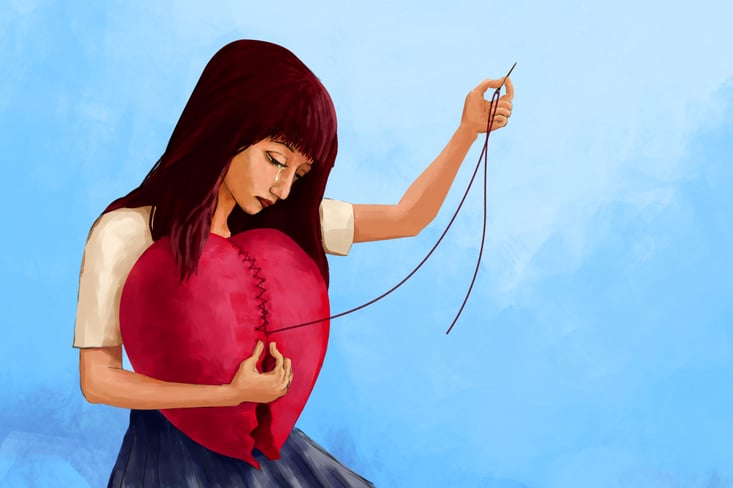
Recovering from the end of a relationship is usually much more difficult than we expect. No matter what our mind might tell us about how necessary or right ending the relationship might be. Regardless of what all our friends tell us about how much better off we'll be, we can feel devastated - both emotionally and physically, for a long time.
First, we're recovering from the loss of connection we had with our partner, a primary fear. As babies, there is an innate understanding that we will not survive if the caretaker breaks the connection and doesn't return. The loss of a connection at the primal level is a life and death experience, and it often feels that way during a breakup. We can literally feel like we're going to die.
Emotionally, a breakup can echo places and times when we felt inadequate or abandoned. Then, we may turn against ourselves and begin hating and blaming the breakup. Fear, despair, and self-doubt may even take over. All of this may be happening without us realizing the childhood pieces informing our feelings about ourselves.
For me, as a therapist, it can be painful to watch people turn against themselves after a breakup. A lovely, lovable person is feeling completely unlovable. So, it's helpful to look deeper to understand what is happening in the brain when we go through a breakup. The brain study during this process is quite fascinating.
Helen Fisher, a brain researcher, has studied the brain when people are experiencing breakups. The research shows that although the person we dated is no longer present, the attachment and love feelings can grow even stronger in their absence.
In Helen Fisher's Ted Talks, she speaks about the power of love and our brain when we are "dumped." Dr. Fisher states that "Romantic love is one of the most addictive substances on earth." As the addiction center of the brain becomes activated with the same strength as being hooked on cocaine. During this process, the body physically hurts with anxiety and actual physical symptoms.
So the term heartache, it turns out, is a genuine physical condition. Dr. Fisher even suggests taking an Advil or Aspirin to help with the physical symptoms of such heartache. But the main message I wish to convey is that we can and will recover from a painful breakup. People who struggle and do not recover from a break up are often the ones who will not seek help. So avail yourself to seeking support.

Knowing that this is an actual physical condition helps us understand that our pain is real and logical. In the beginning, the extreme pain does not mean it will always feel this way - it's a signal that you're headed to something better. Trust the process.
Know that you have to tolerate the feelings and the grief to get through the breakup process. However, these eight suggestions may help on your journey.
8 Ways to Recover from a Breakup
-
Seek individual, group therapy or a 12-step program to help
-
Treat it like the addiction recovery process that it is
-
Disconnect from all contact with the person you broke up with
-
Connect with friends and environments that make you feel supported
-
Get involved in some exercise to stay active and help the healing process
-
Keep a list of what did NOT work in the past relationship
-
Read your list when you start falling into rewriting history about your relationship.
-
Take the time to focus on mindfulness and self-tenderness.
The reality is that one day, the healing does and will come. As Dr. Fisher says, the opposite of love is not hate - it is indifference. So, it turns out that heartache is real, and time does heal all wounds. You will get there. Trust your recovery process to care for yourself, heal, and move forward.
If you need more help recovering from a divorce or breakup, we're here to help. Check out our Imago Relationship Workshops and Imago Relationship Therapy. We have Online Therapy and Online Workshops now too!
Discover more about Imago with our Imago Professional Membership, Imago Professional Facilitators, Imago Professional Training, and Imago Educational Webinars.
 This blog post was written by Evie Shafner, LMFT.
This blog post was written by Evie Shafner, LMFT.


